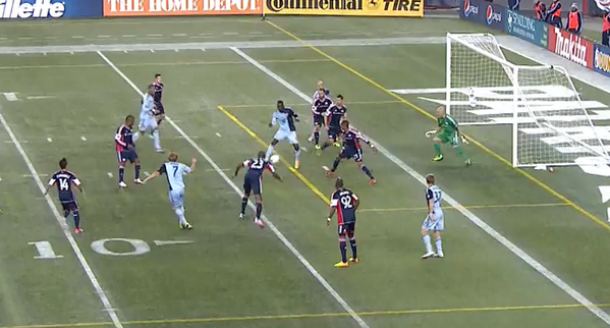Some of the biggest eyesores from todays round of Liguilla MLS matches were blatantly obvious--the yellow soccer lines painted over a gridiron. It was uncomfortable on the eyes, and made many people question whether we were in MLS 2.0--when there would finally be soccer-specific stadia such that we would never see NFL lines again.
For right now, MLS can barely light a candle in terms of ratings, attendance, and overall revenue or prestige to the NFL. But neither can baseball. One would think that MLS could have zero influence over the NFL schedule and preventing the appearance of gridiron markings on MLS pitches. And the situations that we saw today with both Seattle - Portland and New England - Sporting Kansas City would be more commonplace in future years.
But there are several things MLS and the rest of the USSF pyramid (NASL, USL Pro, NPSL, PDL, etc.) can do to rid their matches of gridiron lines.
1) Beat the NFL (and your other sports tenants) to scheduling matches. Leave game times in place and do not change them. Once you have that schedule, play hardball with the NFL and do not give the NFL or the college team any reason as to why you can play with gridiron lines, and be defiant until the NFL or other league switches its schedule.
As I mentioned, in many places, baseball does not carry the NFL's financial muscle. But MLB and individual clubs--particularly the Baltimore Orioles--did just that. They played hardball and remained steadfast on playing their September date at home even though the NFL's Baltimore Ravens had a much more significant opening game against the Broncos. Why was it important? Hosting the opening (Thursday night) game of the NFL season is considered a signifcant honor for winning the previous Super Bowl. The fact the Orioles remained steadfast about playing that home match and denied the Ravens the chance to host a huge game opens up a huge window for MLS teams that share a stadium with NFL teams to go ahead and play that level of hardball. Owners like Robert Kraft who also own the NFL tenant might at first be resistent, but stand to benefit more from the football lines not appearing in the soccer product--and will gain respect for being able to balance the multiple fanbases of their multiple teams. This example goes for every other team in the ladder--at least the first couple of tiers that can afford to fight such fights.
2) Use these matches as urgency to not only build soccer specific stadia, but dictate to potential football or lacrosse tenants.
This one is obvious and something that has been going on for some time. Only Vancouver Whitecaps, New England Revolution and Seattle Sounders do not play in a stadium whose main tenant is a soccer team. And all of those teams but DC United are playing in a stadium that they control. If MLS can get its schedule together and stick with it, no matter what pressure comes in from other sources (like national teams; Brazilian teams stick to their schedule without pressure from the Seleção). The fight has to continue to put more MLS and NASL teams in stadiums that they can control and use to dictate terms to potential football and lacrosse tenants that might share the stadium with the MLS or NASL team.
This will help with the fight to improve the football lines problem. This is more long-term (but not long-term enough for MLS/NASL to wait for NFL or college football's inevitable decline.)
3) Enforce the "no gridiron lines rule" and reverse dates if playing against a team in a soccer-specific stadium.
This is a very easy fix that might not only give MLS or NASL credibility with its own teams, but to the general public in absence of building new stadiums. There are templates with UEFA in which teams have to play their matches at more suitable grounds if their ground does not meet certain requirements. Or if the ground isn't available, the order of legs are reversed--with the seeded (or higher-seeded) team playing at home first. For UEFA, away goals matter. For Liguilla MLS (or NASL matches) away goals do not matter--so there is no reason why who hosts the first leg should not be a practical coin flip, since no benefit is to be had by going away first. It also provides this very incentive to solve the gridiron problem by reversing the order of legs that might just make Liguilla MLS that much more watchable.
But what if the order of legs cannot be reversed? That is a question for another day, and for your comments.










































